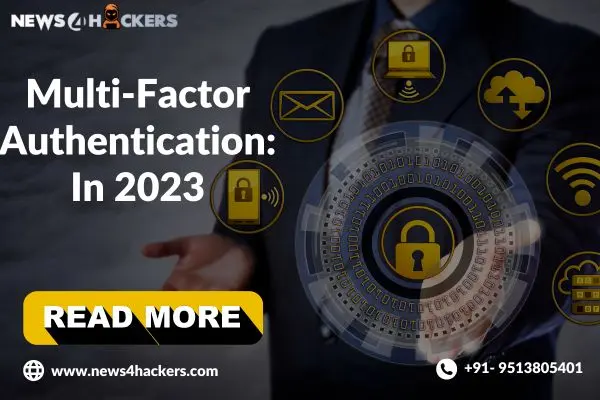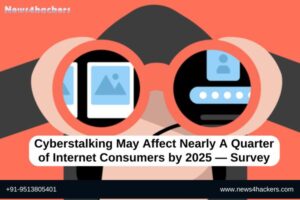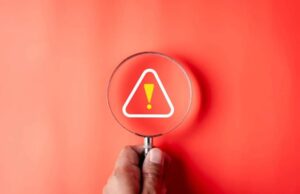Multi-Factor Authentication: In 2023

Do you know about cyber security? Why is it so important? For whom? Well, you will get the answer to all these questions in this article. Cyber security comprises all practices to secure networks, systems, servers, and devices from unauthorized access.
We can talk about these things further in upcoming articles. However, in this article, we will talk about one of its components known as “Multi-Factor Authentication.” let’s talk about this amazing feature/ skill.
What is Multi-factor Authentication?
You can call it either MFA or 2FA (2 Factor Authentication). It is a specially planned security infrastructure that improves the privacy of online accounts and systems by asking for an authorized person’s personal details, which only the authenticated person can tell.
Those things are the key to the system or the user’s account. If the submitted answer doesn’t match the actual details, the account won’t be accessible to the party. It’s like a second layer of protection against unauthorized access.
Some say it’s a combo of username & password itself. You can use it to enhance your security measures. The main objective it follows is that the users need to submit at least two of the following details to authenticate access.
- Something you know.
It could be the PIN or Password that only the actual user can tell.
2.Something you have
Moreover, it could be a tangible item such as – Mobile Phone, a Security Token, or a Smart Card.
3.Something you are
Sometimes, it could be a biometric security pass such as – Fingerprint Sensor, Facial Sensor, or Retinal Scanner.
These can save a lot of time and limit unauthorized access. Ex – if anyone got your password, they might not have access to your account without having a physical device/ biometric data related to the A/c.
The particular installation of MFA depends on the services/ systems. Common ways involve – getting OTP via SMS/ email while utilizing an authentication app such as – Google Authenticator/ Authy to generate codes/ biometric details to unlock the device/ A/c.
Why is Multi-factor Authentication necessary in 2023?
The Multi-Factor Authentication is necessary in 2023 for various reasons, as follows.
a) Increased Cybersecurity Threats
Due to rising cybersecurity attacks, we need an MFA that provides an extra layer of protection against online threats.
b) Data Breaches & Password Leaks
Due to a high range of Data breaches, companies, and individuals need extra safety to protect their data against such threats. MFA stops unwanted attacks by adding an extra layer of security before the password.
c) Phishing Attacks
Extreme Phishing Attacks are raising the need for extra security, which can be possible with MFA cuz even if someone knows your password, they won’t be able to pass the second layer of security.
d) Remote Work & Cloud Services
Due to the flexibility of the work environment, sometimes we work remotely and connect our devices for free-wifi, which could put our sensitive data in danger. MFA assures the limitation of access to such resources from unidentified threats.
e) Regulatory Compliance
Several industry-standard rules & regulations are applied to the company’s infrastructure to safeguard the data and resources for more privacy. Installing MFA can ensure compliance with these laws.
f) Strengthening Weak Passwords:
Don’t use weak passwords that can be easily guessed. MFA completes the need for limited passwords with robust security measures.
g) Mobile Device Security
Excessive use of smart device features like MFA’s Biometric Authentication can secure Mobile Devices against online threats that can access sensitive data inside such devices.
h) Account Takeover Prevention
MFA assists in preventing unauthorized users from accessing accounts, which could result in identity theft, financial loss, and other undesirable outcomes.
i) Cybersecurity Awareness
As consumers learn more about cybersecurity best practices, they understand how crucial it is to use MFA to protect their online identities and assets.
Places that needed Multi-Factor Authentication?
This feature is suggested for various areas and situations where security is essential. Some of the places are as follows.
- Online Accounts
This includes
- Email Accounts,
- Social Media Platforms,
- Online Banking,
- E-commerce Sites, and
- Online Services containing personal/ financial data.
- Work Accounts
Recommended for accessing
- Work-Related Systems,
- Email Accounts,
- Remote Access to Company Resources, and
- Other Corporate Tools.
- Cloud Services
Cloud Storage & Collaboration Services such as follows
- Dropbox,
- Google Drive, and
- Microsoft OneDrive contains sensitive documents & data.
- Remote Access
MFA should be used in any situation involving remote access, such as when accessing a corporate network from outside the office, to ensure secure connections.
- VPN (Virtual Private Network)
Using MFA when connecting to a private network gives an extra degree of security against illegal access.
- Financial Services
MFA should be used in the following places to protect customer funds and transactions
- Online Banking,
- Investment Accounts, and
- Other Financial Services.
- Healthcare Records
To guarantee patient privacy and HIPAA compliance, electronic health records and patient information systems should be secured with MFA.
- Email Services
Securing email with MFA is essential to thwart illegal access and potential account takeovers because email accounts frequently act as a gateway to several other accounts.
- Educational Institutions
MFA should be used in educational platforms and systems containing student data and academic records to safeguard sensitive data.
- Government Services
To protect citizens’ personal information, the following entities should use MFA
- Government Portals,
- Tax Filing Systems, and
- Online Services Associated with the govt.
- Customer Portals
Customers can access their information on customer portals provided by businesses that sell services or products. Moreover, customer data is protected by using MFA.
- Social Media Management
Using MFA can help people or organizations who manage social media accounts avoid illegal access that might harm their reputation.
- IoT (Internet of Things) Devices
MFA should be used to safeguard smart homes & other IoT devices that are remotely controllable to prevent illegal access.
- Domain Management
To stop domain hijacking and unauthorized changes, website owners must secure domain administration accounts with MFA.
- Many contemporary applications and services use Authentication for Applications
APIs and authentication procedures. Using MFA for application authentication can help safeguard sensitive information and guarantee secure communications.
Scope of Multi-Factor Authentication?
MFA can be used in various situations and sectors where securing access to sensitive data, systems, and resources is essential. The following are some crucial areas where MFA is crucial:
- Online Security
This feature is used to protect online A/cs such as
- Email,
- Social Media,
- Online Banking, and
- E-commerce Platforms.
It supports securing private & financial data from anonymous users.
2.Corporate Security
Organizations install MFA to protect
- Employee Accounts,
- Remote Access to Corporate Networks, and
- Sensitive Company Resources.
3. Data Protection
improves data security by assuring only authorized users can access confidential data saved in the following places.
- Cloud Services,
- Databases, and
- Applications
4. Financial Services
To protect transactions, online banking, & investment a/cs for reducing the risk of fraud and unauthorized access to funds.
- Banks,
- Financial Institutions, and
- Payment Processors.
5. Healthcare
MFA is essential in healthcare infrastructure to protect the following things for ensuring patient privacy & compliance with regulations
- Patient Records,
- Medical Information Systems, and
- Electronic health records.
6. Government & Public Services
Government agencies implement MFA to secure
- Citizen Portals,
- Tax Systems, and
- Online govt. Services storing personal & confidential data.
7. Educational Institutions
Schools and universities use MFA to protect
- Student Records,
- Academic Systems, and
- E-learning platforms from hacking.
8. Mobile Security
Biometric MFA is used to secure mobile devices to prevent unwanted access to the device and its apps.
9. IoT Security
Internet of Things (IoT) devices use MFA to prevent unauthorized access and management of
- Smart Home Systems,
- Medical Equipment, and
- Industrial IoT Apps.
10. Application Access
It is used by several platforms & apps to guarantee that only authorized users can access and communicate with them.
11. Critical Infrastructure
The following sectors use it to secure vital infrastructure systems against hacker attacks and unauthorized access.
- Energy,
- Transportation, and
- Utilities.
12. E-commerce & Retail
To Reduce the risk of fraud & unauthorized shopping, E-commerce uses MFA to secure the following things.
- Customer Accounts,
- Loyalty Programs, and
- Online Shopping Platforms.
13. Social Media Management
MFA is used by social media networks and business accounts to prevent
- Unauthorized Access and
- Potential Reputation Damage.
14. Authentication & Authorization
It is incorporated into procedures for authentication and authorization for
- APIs,
- Third-Party Integrations, and
- Various Software Systems.
15. Cybersecurity Compliance
The use of MFA is mandated by several industry standards and data protection laws as part of security compliance initiatives.
Who should use Multi-Factor Authentication?
It is suggested that internet users access sensitive data using digital services/ maintaining online a/cs. The following are some particular groups of people you should think about employing MFA:
- Individuals,
- Businesses & Employees,
- Remote Workers,
- Students,
- E-commerce Customers,
- Financial Services Customers,
- Healthcare Professionals,
- Government Employees & Citizens,
- Developers & IT Professionals,
- Business Owners,
- Travelers,
- Social Media Influencers & Brands,
- Smart Home Users,
- Freelancers & Contractors,
- Any Service Requiring Security.
Where Should I Learn Multi-Factor Authentication?
If you wish to learn this skill, you can contact Craw Security, which offers the best 1 Year Cyber Security Diploma Course in Delhi for IT Professionals who want to enhance their knowledge and skills in cyber security techniques & skills.
This diploma course is highly recommended to aspirants who want to widen their knowledge of cybersecurity concepts with practical knowledge. Moreover, under the premises of Craw Security, students can find their real strengths and weaknesses in understanding the concepts.
Frequently, they will be handed over some tasks to improve their practical skills while using the latest cybersecurity tools. These tools are available in the IT Industry and are helping organizations to keep a secure working infrastructure.
After completing this course, you can sit in the cybersecurity exam to assess your knowledge based on your performance. Furthermore, you will get a certificate for passing the exam. This certification is valid in several MNCs and will be working as evidence of your skills. What are you waiting for? Start Learning!
Read More Article Here:
Mumbai Man Defrauded of ₹50,000 in An Online Gift Card Scam
Bangladeshi Hackers Hacked Noida School Official Website!!!









